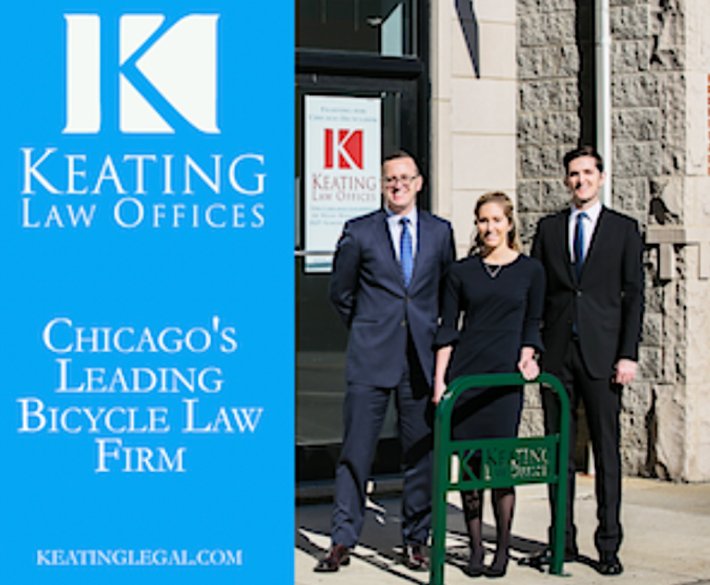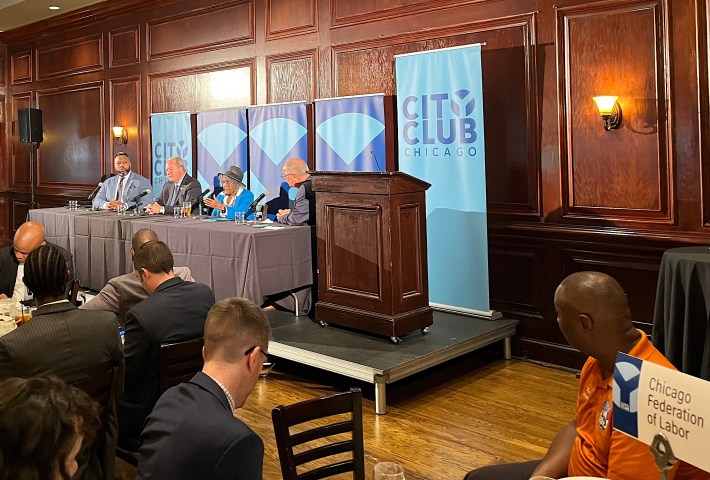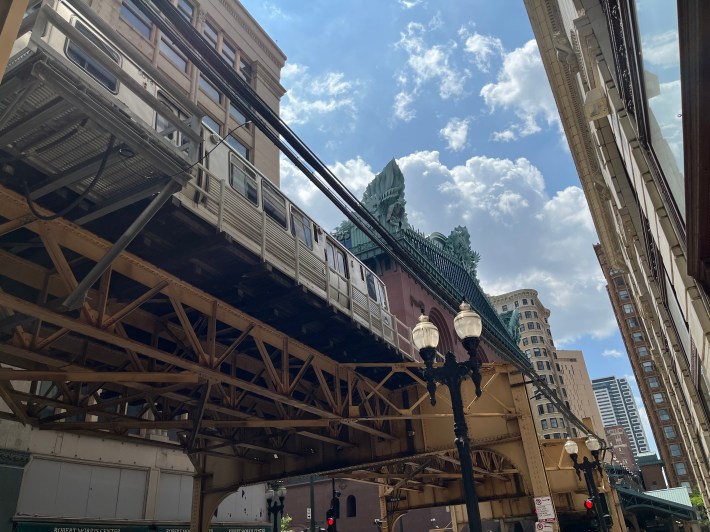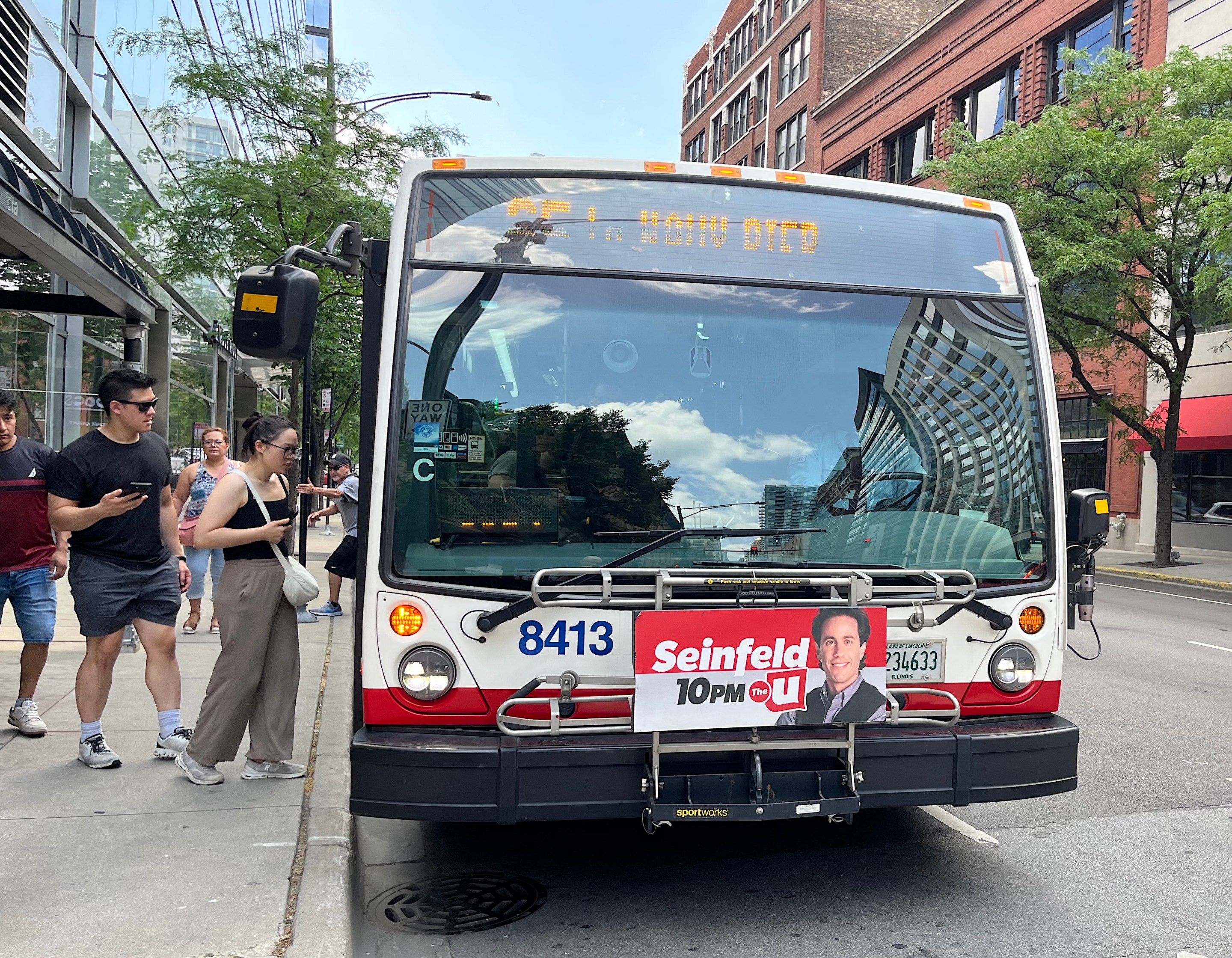
Streetsblog Chicago readers know all too well by now that our region's public transportation system, and therefore the fortunes of the entire state of Illinois, are at a crossroads right now. That's a result of what happened last May 31 in the state capitol, a day that will live in infamy as "The Night Transit Funding Didn't Go Down In Springfield."
Today City Club of Chicago, known for hosting panel discussion that aim to address the area's greatest challenges, appropriately held one called "How Do We Get There? The Future of Illinois Transit." David Greising, president of the Better Government Association, served as moderator.
"We are at a moment where we're facing the immediate fiscal cliff of $771 million," Greising said to kick things off. "The legislation that had been expected and hoped for came very close but did not pass. And so while we're waiting for the passage of legislation... And then we have a question of, how do we get there?" He said the talk would focus on governance, safety, and revenue.
The panelists included key players in the downstate drama: Sen. Don DeWitte (R-St. Charles), Rep. Kam Buckner (D-Chicago), and Center for Neighborhood Technology Vice President for Government Affairs Jacky Grimshaw.

Rep. Buckner began the conversation by talking about baseball. "Many folks remember the famous 8/8/88," he said, referring to the date Wrigley Field held its first-ever night baseball game. "Another date in '88 was June 30 of '88, which was when the clock stopped in Springfield." That referred to the time then-governor Jim Thompson persuaded the General Assembly to approve a tax-subsidy within a mere eight hours for a new White Sox stadium that kept the team from moving to Florida.
"We remember stopped clocks," Rep. Buckner "So for those of us in Springfield who were really trying to get this over the finish line before the end of session that was no longer an option... It was a bit of a surprise that the entire revenue package that the Senate took up was there at that time. We had been working pretty closely in both chambers and with the governor's office to make sure that we brought forward a package that would deal with reform, governance and structure in that space... Once the Senate started moving, we decided to let them do that, and we would figure out if [the bill] got to us in time. Obviously it got to us at 11:57 that night and we don't stop the clocks." The audience laughed.
Ms. Grimshaw noted that sustainable transportation advocates like her lobbied in Springfield for the entire month of May. "The advocates were represented by several groups," she said. "[Former state senator] Elaine Nekritz, her firm was the consultant for us... Audrey Wennink from the Metropolitan Planning Council and Amy Rynell from Active Transportation Alliance, and Dany Robles from the Illinois Environmental Council. So those were folks on our side, so to speak."
She added that Labor representatives were also there, as were staff from Senate President Don Harmon and Governor JB Pritzker's offices. "But even with that large group, not everybody talked," she said.
Sen. DeWitte discussed the state legislators' sausage-like process of trying to assemble transit funding and governance bills. "The Tuesday before the end of session, those two issues got rolled into the same bill," he said. "And we had represented, on our side of the aisle, to [Sen. Ram Villavalam (D-Chicago), the sponsor], that that would be a very difficult pull for us. We had very little interest in pursuing additional tax increases, tax revenues. It has always been our position on our side that there's plenty of revenue coming into the system. A $1.1 billion dollar tax increase for a $1.50 delivery fee for everything from groceries, prescription drugs, some of which were exempted, to pizza and Chinese meals, anything ordered with a computer, with a $1.1 billion revenue increase attached to it, we always believed was going to be problematic."

Discussing Sen. Villavalam's proposal to turn the Regional Transportation Authority into a more powerful Northern Illinois Transit Authority, Sen. DeWitte said he worried the new governance structure would disempower the suburbs.
"There is no reason why anyone would want to steamroll the collar counties," Ms. Grimshaw responded. She argued that Chicagoans need to take Metra and Pace to get to the suburbs for work and other destinations just as much as the reverse is true.
Rep. Buckner added, "People don't care about RTA or CTA or MMA [the Metropolitan Mobility Authority proposal to fuse the four transit agencies], which we didn't ever get to, or NITA. They care about GTW, get to work, GTS, get to school and it's our job, frankly, to GSD, which is get stuff done. If we can't, then WTF?" The crowd chuckled.
Ms. Grimshaw questioned Sen. DeWitte's previously stated opposition to raising revenue for transit via the so-called "pizza tax". "During Sen. Villavalam's presentation to the transportation committee on this bill, the last thing he said was 'If you you have any ideas for revenue sources, bring them to me,'" she said. "And so, Don, what are those revenue sources? I know what we came up, you don't approve of most of them, so what to we do? You say you want to close the cliff. You can't close the cliff with wishful thinking, you gotta close it with some revenue. So if our ideas are unacceptable, what's acceptable?" Attendees chuckled.
"We're having those conversations right now," Sen. DeWitte responded. "I'm not going to negotiate right here at this table." More laughter.
Rep. Buckner later said, "We've got to figure out how to get past any differences we may have and make this happen because this is not just important for today, but we're building the system for the future, and our legacy depends on this. 50 years from now if someone is sitting at this table, I'll be damned if they say Don DeWitte and Kam Buckner f-ed up." The audience was amused.
Near the end of the discussion, participants indicated the the emergency summer legislative hearing might take place around the Illinois State Fair, August 7-17, when many legislators will be in Springfield anyway.

After the talk was over, I buttonholed Rep. Buckner. I noted RTA Board Chair Kirk Dillard recently said he felt the "No Revenue Without Reform" team at the statehouse spent too much time debating governance reform, waiting until the eleventh hour to propose revenue solutions. Did Rep. Buckner have any misgivings about what happened?
"What I regret is that we found a way to fund between 800 million and a billion dollar for transit without having parameters for how it's supposed to work," he replied. "We took as long as we could to figure that out. But I think the revenue will come very shortly."
So he's hopeful that the reform and revenue issue will get sorted out during the summer session?
"I truly believe that. I don't know if it will be the summer session or in October, but the next time we get back to Springfield, whenever that is."
If the decision is delayed until the fall veto session, that would almost certainly require the transit agencies to drastically cut 2026 service and lay off thousands of workers. So let's keep our fingers crossed that this will get resolved while Snoop Dogg, Brad Paisley, and Def Leppard are rocking the Illinois State Fair Grandstand this August.

Did you appreciate this post? Streetsblog Chicago is currently fundraising to help cover our 2025-26 budget. If you appreciate our reporting and advocacy on local sustainable transportation issues, please consider making a tax-deductible donation here. Thank you!





